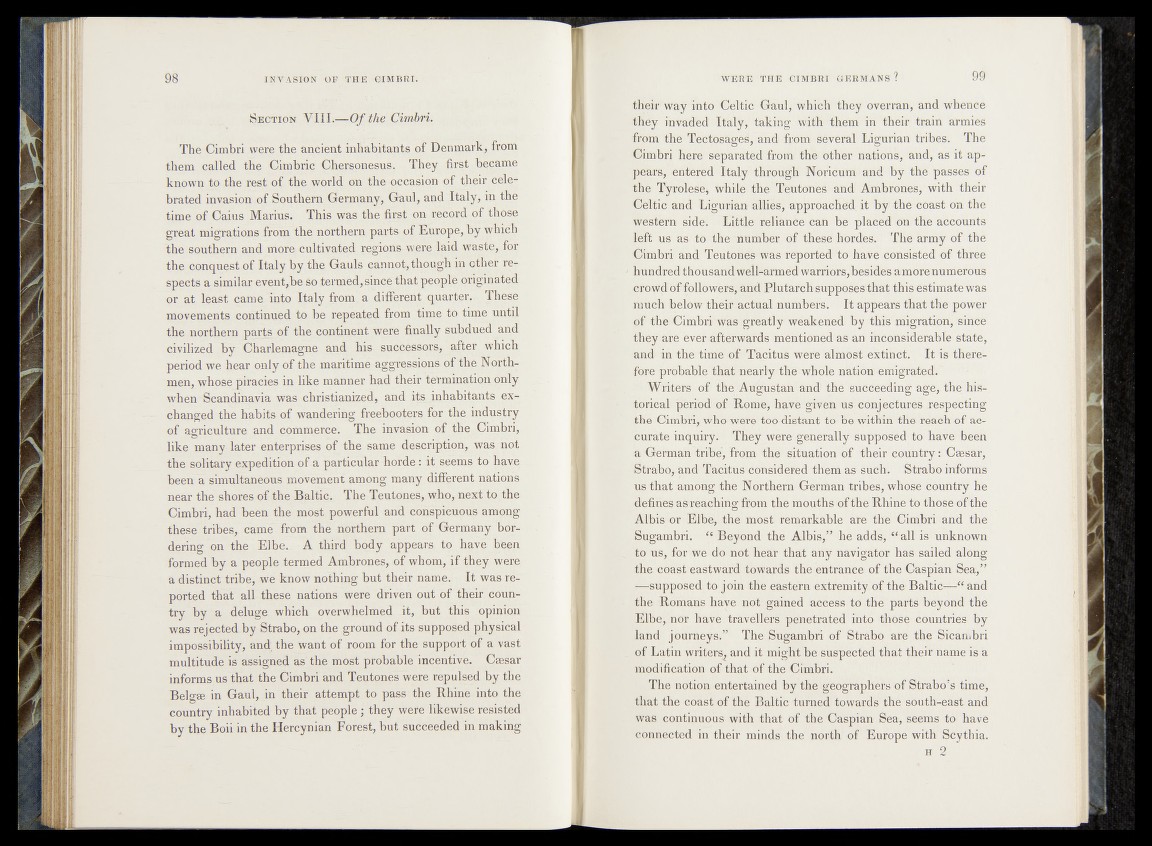
Section V III.—-Of the Cimbri.
The Cimbri were the ancient inhabitants of Denmark, from
them called the Cimbric Chersonesss., They first became
known to the fost of the world on the occasion of their^ete-
brated invasionof.Southern Germany, Gaul, and Italy, in the
time of Caius Marius. This was the first on record of those
great migrations from the northern parts of Eujppe, 'by which
the southern and mqre^ cultivated regions-were laid wasfe^ for
the conquest of Italy by the Gauls cannot, though in other respects
a similar event,he so termed,since that people paginated
or at least came Into Italy from, a different quarter... These
movements continued to be repeated from time to time until
the northern parts of the continent wefe finally subduedjind.
civilized by Charlemagne and his-successors, a|te r wh;ich
period we hear only of the maritime aggrpsvsions,qf the Northmen,
whose piracies in like manner had theirj&minatioqorfly
when -Scandinavia was christianized, and its inhabitants exchanged
the habits of wandering freebooters for the^miusfry
of agriculture and commerce. The invasion of the^Cimbri,
like many later enterprises of the same Inscription, was ngt
the solitary expedition of a particular horde: h.ayq
been a simultanëous movement among many different rmfohs
near the shores of the Baltic. The Teutones^who, next fo the
Cimbri, had been the möst powerful and cohspiettous afnp^.g
these tribes, came- from the northern part oCGermany bordering
on the Elbe. A third body appears to h^ye been
formed by a people termed Ambrones, o f whom, if they were,
a distinct tribe, we know nothing but their name^ It was reported
that all-these nations were driven out of their, country
by a deluge which overwhelmed it, but this opinion
was rejected by Strabo, on the ground of its supposed physical
impossibility, and the want of room for the support of a vast
multitude is assigned as‘ the most probable incentive. Caesar
informs us that the Cimbri and Teutpneswere repulsed by the
Belg® in Gaul, in their attempt to pass the Rhine into the
country inhabited by that people; they wefe likewise resisted
by the Boii in the Hercynian Forest, but succeeded in making
their way' int'ö^Cédtfcd Gaul, which they overran, and whence
^ney invaded Italy^’fak in g ^ ith them in their train armies
from the' TJebfpsÖgfes, and from several Ligurian tribes. The
Cimbri here'separated from the other nations, and, as it ap-
pears^leaterb'd Italy through Nofeidum and by the passes of
thé Tyrolese* wn||ë the/Teutonés and AmbroheS, with their
Celtio^nd'fcig&ian-'alliesj approachdd if by the coast on the
western side» Llttfo»'relfpffll can be placed on the accounts
left u>| as»hfê®the number of ihfes^lfprdfes1; " The army of thé
dSlmbri and TeutbfrësdWas reported'fo have consisted of three
h u ndffdtjiou sand well-armed- warriors,besides a more numerous
erowdbffollowers,land Plutarch supjiOSesthat this estimate was
much befow- their lacteal nuffitóé'fS'.^l I t 'appéars’that the power
of thei’Cïmbri’wa?s^grédtl y weakened by this migration, since
5 öèyiare'eyef .afterwards mentioh'MéÉs^n ihcohsitferabl e state,
and in the tim^of llPacitus were 'ali]fost !^4ihCt.^ It is therefore
-flfobab'le fMatrnearly thp whole nation- emigrated."
is me;Augustan anU M'^»ubcVéd-ivkg age^ the his-,
fotical period of Rome, ha^flgi ven^tdS^^nj“e,QliurcS..i‘es]iectit]g
the-Gimbri; who^rbiflpdistant tpufft within' tM’O-rëachiöf ac-
Sffurate* mquir yM1 They were 'gehefSl?psupposëd to have1 been
^.GeVman'tribeV from the situation of thMr^cbufitry: Ceesar,
#tfabo,.’and T-acifu vcims^dcned them a^suchl Strabo-informs
us that among the Northern German tribes, who|efcpufitry he
defines aè reaching from the months of the Rhindtb thoseoTthe
«Afbis or Mb<£Lthe mostl remarkable are the^Cimbri and the
Sugambri. “ Beyond the Albis,” he adds, “ all iSyunknown
§t©MI, for we do not hear that any navigatovbllf^afled along
the cpH|t:eastward towards the entrance of the Caspian Seay1.-’
—^supposed; to join the eastern extremityfof the Baltf<&|-%&nd
the Romans have -not gained access to the'partsfbeyond'tne
Elbe; nor havé. travellers penetrated into those countries by
land journeys.” The. Shgambri of* Strabo are,.the Sicambri
of Latin writers, and it might be spspebted that their name is a
modification of that of the Cimbri.
b The notion entertained by thé geographers of Strabo's timb,
that the coast of the Baltic turned5 towards' theljputh-east and
was contirrudpi^with that of dps Caspian Séa, sfeeriiSfo have
connected in their minds the north of Europe with Scythia.
h 2